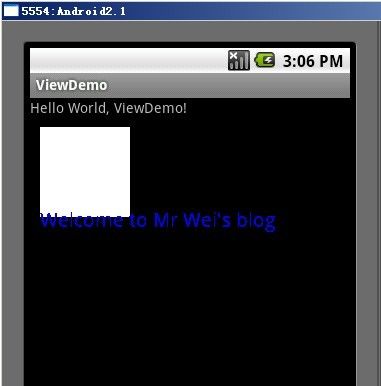今天我们的教程是根据前面一节扩展进行的,如果你没有看,请点击《Android高手进阶教程》3.Android中自定义View的应用,这样更容易理解。
在xml文件里定义控件的属性,我们已经习惯了android:attrs="",那么我们能不能定义自己的属性能,比如:test:attrs=""呢?答案是肯定的。
好了我就不卖关子了,直接进入主题。大致以下步骤:
一、在res/values文件下定义一个attrs.xml文件。代码如下:
|
1
2
3
4
5
6
7
|
<?
xml
version
=
"1.0"
encoding
=
"utf-8"
?>
<
resources
>
<
declare-styleable
name
=
"MyView"
>
<
attr
name
=
"textColor"
format
=
"color"
/>
<
attr
name
=
"textSize"
format
=
"dimension"
/>
</
declare-styleable
>
</
resources
>
|
二、我们在MyView.java代码修改如下,其中下面的构造方法是重点,我们获取定义的属性我们R.sytleable.MyView_textColor,获取方法中后面通常设定默认值(float textSize = a.getDimension(R.styleable.MyView_textSize, 36 ); ),防止我们在xml文件中没有定义,从而使用默认值。
获取MyView就是定义在<declare-styleable name="MyView "></declare-styleable>里的名字,获取里面属性用 名字_ 属性 连接起来就可以。TypedArray通常最后调用.recycle()方法,为了保持以后使用该属性一致性!
|
1
2
3
4
5
6
7
8
9
10
11
12
13
14
|
public
MyView(Context context,AttributeSet attrs) {
super
(context,attrs);
mPaint =
new
Paint();
TypedArray a = context.obtainStyledAttributes(attrs, R.styleable.MyView);
int
textColor = a.getColor(R.styleable.MyView_textColor,
0XFFFFFFFF
);
float
textSize = a.getDimension(R.styleable.MyView_textSize,
36
);
mPaint.setTextSize(textSize);
mPaint.setColor(textColor);
a.recycle();
}
|
MyView.java全部代码如下:
|
1
2
3
4
5
6
7
8
9
10
11
12
13
14
15
16
17
18
19
20
21
22
23
24
25
26
27
28
29
30
31
32
33
34
35
36
37
38
39
40
41
42
43
44
45
46
47
48
49
50
51
52
53
|
package
com.android.tutor;
import
android.content.Context;
import
android.content.res.TypedArray;
import
android.graphics.Canvas;
import
android.graphics.Color;
import
android.graphics.Paint;
import
android.graphics.Rect;
import
android.graphics.Paint.Style;
import
android.util.AttributeSet;
import
android.view.View;
public
class
MyView
extends
View {
private
Paint mPaint;
private
Context mContext;
private
static
final
String mString =
"Welcome to Mr Wei's blog"
;
public
MyView(Context context) {
super
(context);
mPaint =
new
Paint();
}
public
MyView(Context context, AttributeSet attrs) {
super
(context, attrs);
mPaint =
new
Paint();
TypedArray a = context
.obtainStyledAttributes(attrs, R.styleable.MyView);
int
textColor = a.getColor(R.styleable.MyView_textColor,
0XFFFFFFFF
);
float
textSize = a.getDimension(R.styleable.MyView_textSize,
36
);
mPaint.setTextSize(textSize);
mPaint.setColor(textColor);
a.recycle();
}
@Override
protected
void
onDraw(Canvas canvas) {
// TODO Auto-generated method stub
super
.onDraw(canvas);
// 设置填充
mPaint.setStyle(Style.FILL);
// 画一个矩形,前俩个是矩形左上角坐标,后面俩个是右下角坐标
canvas.drawRect(
new
Rect(
10
,
10
,
100
,
100
), mPaint);
mPaint.setColor(Color.BLUE);
// 绘制文字
canvas.drawText(mString,
10
,
110
, mPaint);
}
}
|
三、将我们自定义的MyView加入布局main.xml文件中,平且使用自定义属性,自定义属性必须加上:
xmlns:test ="http://schemas.android.com/apk/res/com.android.tutor"
蓝色是自定义属性的前缀,红色是我们包名。
main.xml全部代码如下:
|
1
2
3
4
5
6
7
8
9
10
11
12
13
14
15
16
17
18
19
20
|
<?
xml
version
=
"1.0"
encoding
=
"utf-8"
?>
<
LinearLayout
xmlns:android
=
"http://schemas.android.com/apk/res/android"
xmlns:test
=
"http://schemas.android.com/apk/res/com.android.tutor"
android:orientation
=
"vertical"
android:layout_width
=
"fill_parent"
android:layout_height
=
"fill_parent"
>
<
TextView
android:layout_width
=
"fill_parent"
android:layout_height
=
"wrap_content"
android:text
=
"@string/hello"
/>
<
com.android.tutor.MyView
android:layout_width
=
"fill_parent"
android:layout_height
=
"fill_parent"
test:textSize
=
"20px"
test:textColor
=
"#fff"
/>
</
LinearLayout
>
|
四、运行之效果如下图:
